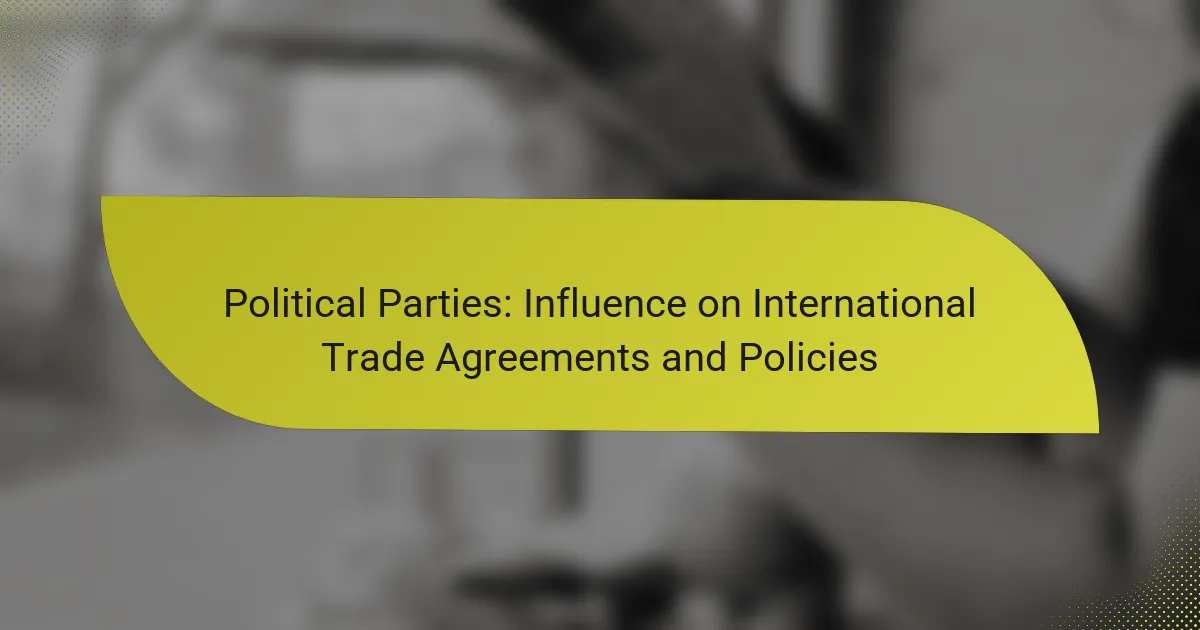Political parties are instrumental in shaping international trade agreements and policies, as they establish the priorities and strategies that guide negotiations. Their influence is rooted in their ideologies and the political power they wield, affecting both legislative priorities and public opinion on trade matters. The impact of these parties varies across countries, with major political entities often determining the direction of trade strategies in both developed and emerging economies.
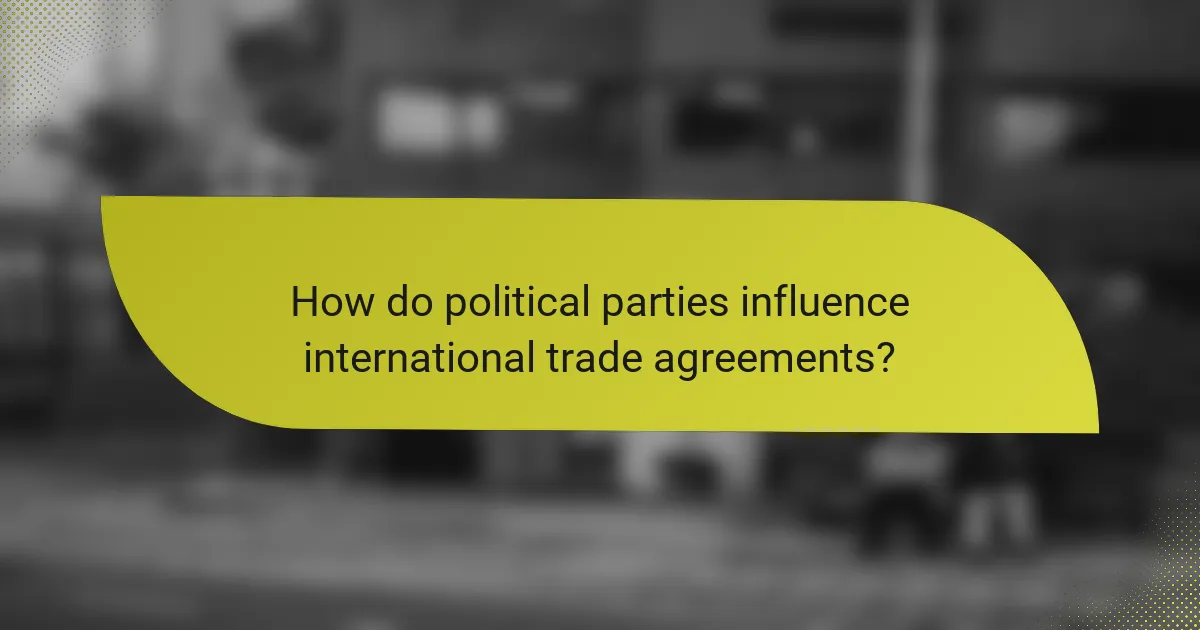
How do political parties influence international trade agreements?
Political parties play a crucial role in shaping international trade agreements by determining the priorities and strategies that guide negotiations. Their influence stems from their ideologies, policy platforms, and the political power they hold within government structures.
Policy formulation by major parties
Major political parties are instrumental in formulating trade policies that reflect their economic philosophies. For instance, a party favoring free trade may advocate for reduced tariffs and open markets, while a protectionist party might push for stricter import regulations to shield domestic industries.
The policy formulation process often involves extensive debate within the party and can be influenced by lobbying from various interest groups, including businesses and labor unions. These discussions shape the party’s official stance on trade agreements, which can significantly impact negotiations.
Impact of party ideologies on trade
Party ideologies directly affect their approach to international trade. Liberal parties typically support globalization and multilateral agreements, believing in the benefits of free markets. In contrast, conservative or nationalist parties may prioritize domestic job protection and advocate for bilateral agreements that favor their national interests.
This ideological divide can lead to significant differences in trade policy outcomes, affecting everything from tariff levels to regulatory standards. For example, a left-leaning party may emphasize environmental protections in trade agreements, while a right-leaning party might focus on economic growth and deregulation.
Case studies from the United States
In the United States, the influence of political parties on trade agreements is evident in recent history. The Democratic Party’s support for the [censured]-Pacific Partnership (TPP) was rooted in a commitment to progressive trade policies, while the Republican Party’s opposition highlighted a shift towards protectionism under the Trump administration.
Additionally, the renegotiation of NAFTA into the USMCA reflects how party priorities can reshape existing agreements. The changes aimed to address labor rights and environmental standards, showcasing the Democratic Party’s influence on trade policy during the negotiation process.
Examples from European Union member states
In the European Union, political parties also shape trade policies significantly. For example, parties in countries like France and Germany often debate the merits of EU trade agreements with external partners, balancing economic benefits against social and environmental concerns.
In recent years, the rise of populist parties in several EU member states has led to increased scrutiny of trade agreements, advocating for more protectionist measures. This shift has prompted the EU to reconsider its approach to negotiations, particularly regarding agreements with countries that have lower labor and environmental standards.
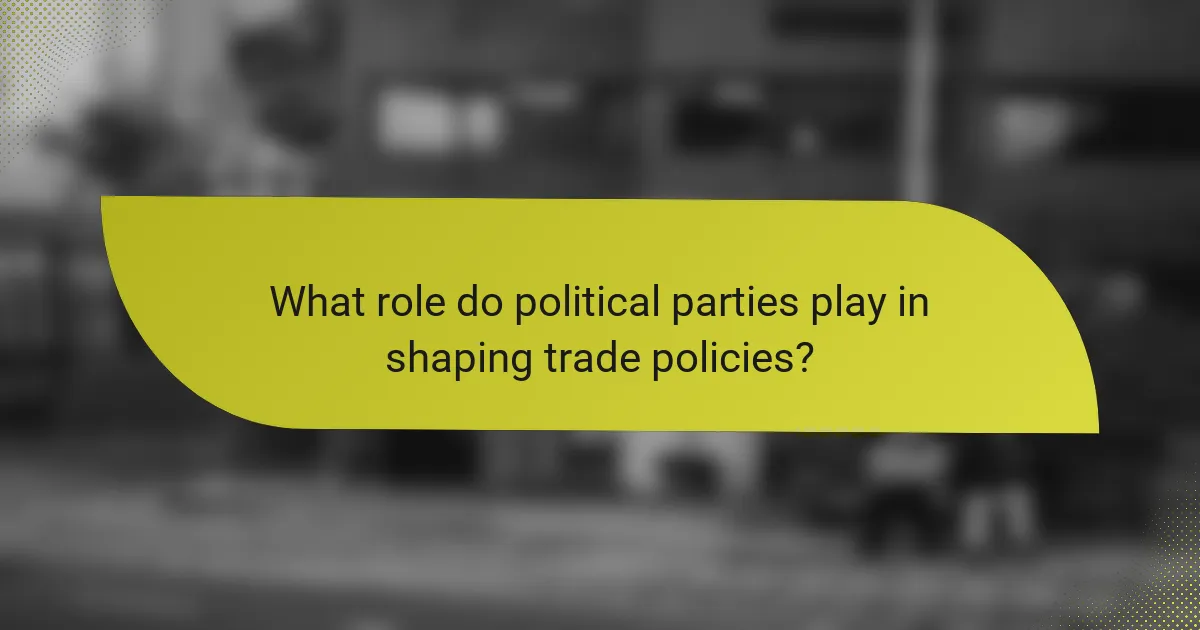
What role do political parties play in shaping trade policies?
Political parties significantly influence trade policies by determining legislative priorities and shaping public opinion. Their platforms often reflect the economic interests and ideologies that guide international trade agreements and negotiations.
Legislative processes and trade policy
Political parties play a crucial role in legislative processes that govern trade policy. They can introduce, support, or oppose trade bills, impacting the speed and direction of trade agreements. For example, a party in power may prioritize free trade agreements, while opposition parties might advocate for protectionist measures.
In many countries, trade agreements require approval from the legislature, where party alignment can determine the outcome. A unified party can streamline the passage of trade legislation, while a divided legislature may lead to prolonged debates and amendments.
Party platforms and trade positions
Each political party typically has a platform that outlines its stance on trade issues, which can vary widely. For instance, left-leaning parties may emphasize labor rights and environmental protections in trade agreements, while right-leaning parties might focus on deregulation and market access.
Voter sentiment can also shape these platforms. Parties often adjust their trade positions based on public opinion, especially during election cycles. Understanding a party’s trade stance can help businesses and stakeholders anticipate changes in trade policy and prepare accordingly.
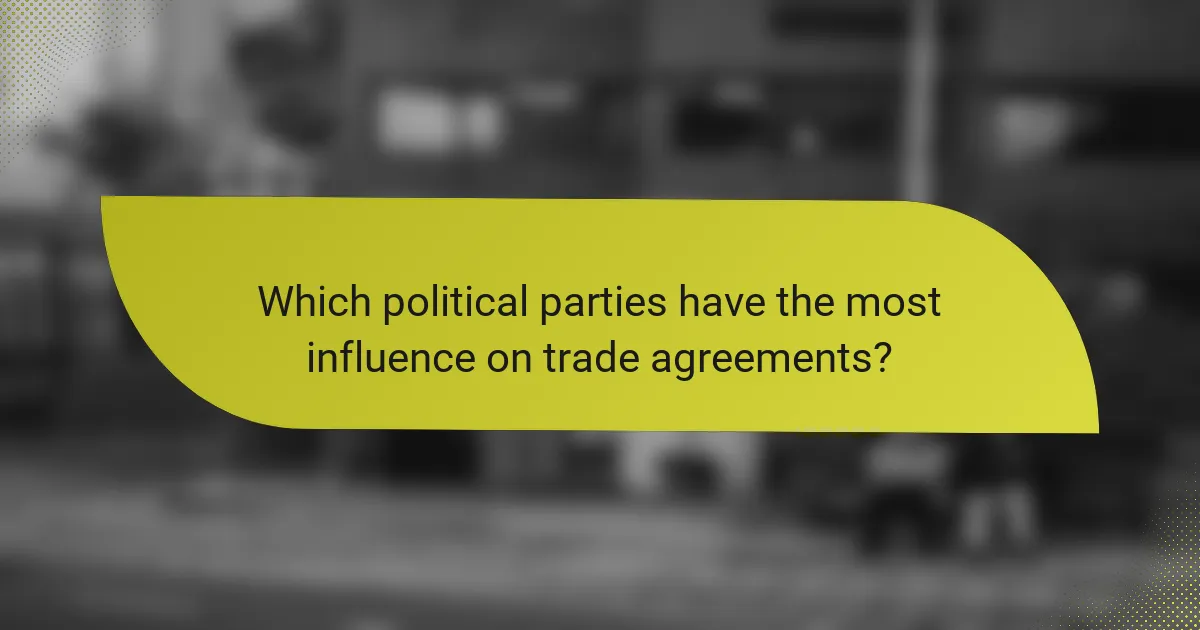
Which political parties have the most influence on trade agreements?
The influence of political parties on trade agreements varies significantly by country, with major parties often shaping policies that affect international trade. In the United States, the Democratic and Republican parties have distinct approaches, while in the UK, influential parties include Labour and the Conservatives. Emerging economies also have key political entities that impact their trade strategies.
Democratic Party’s approach in the US
The Democratic Party generally advocates for trade policies that emphasize labor rights, environmental standards, and fair trade practices. This approach often leads to support for agreements that include provisions for worker protections and sustainable development.
For example, the Democratic stance on the United States-Mexico-Canada Agreement (USMCA) focused on improving labor conditions in Mexico to prevent job losses in the US. This reflects a broader trend of prioritizing social and environmental considerations in trade negotiations.
Republican Party’s trade strategies
The Republican Party typically favors free trade agreements that promote market access and economic growth. Their strategies often emphasize reducing tariffs and barriers to trade, which they argue stimulates competition and benefits consumers.
Recent Republican administrations have pursued policies like renegotiating existing agreements to prioritize American interests, as seen in their approach to the USMCA. This party’s focus is often on deregulation and fostering a business-friendly environment.
Influential parties in the UK
In the UK, the Conservative Party and the Labour Party play significant roles in shaping trade policy. The Conservatives generally advocate for free trade and have pushed for new agreements post-Brexit, aiming to establish the UK as a global trading partner.
Conversely, the Labour Party tends to focus on protecting workers’ rights and ensuring that trade agreements do not undermine domestic industries. This difference in priorities can lead to contrasting approaches in negotiations and policy formulation.
Key parties in emerging economies
Emerging economies often have political parties that prioritize trade policies reflecting their developmental goals. For instance, in India, the Bharatiya Janata Party (BJP) supports liberalization and foreign investment, aiming to boost economic growth through trade.
In contrast, left-leaning parties in these regions may advocate for protectionist measures to shield local industries from foreign competition. This dynamic creates a complex landscape where trade agreements must balance economic growth with local interests.

What are the criteria for evaluating party influence on trade?
Evaluating party influence on trade involves assessing their historical performance in negotiations, alignment with public opinion, and the impact of their policies on international agreements. These criteria help determine how effectively a political party can shape trade outcomes and influence economic relationships with other countries.
Historical performance in trade negotiations
Historical performance in trade negotiations is a key indicator of a party’s influence. Parties with a track record of successfully negotiating trade agreements often have established relationships with other nations and a deep understanding of trade dynamics. For instance, parties that have previously signed significant agreements, such as NAFTA or the EU trade deals, demonstrate their capability in this area.
When evaluating a party’s past, consider the number and scope of agreements they have facilitated. Successful negotiations can lead to increased exports, job creation, and economic growth, while failures may result in trade deficits and economic challenges.
Public opinion and party alignment
Public opinion plays a crucial role in shaping a party’s trade policies and their overall influence. Parties that align their trade agendas with the prevailing sentiments of their constituents are more likely to gain support for their initiatives. For example, if a significant portion of the electorate favors protectionist measures, a party may adjust its stance to reflect this view.
Monitoring public opinion polls can provide insights into how trade policies are perceived, which can inform a party’s strategy. Parties that fail to align with public sentiment risk losing voter support, which can diminish their influence in trade negotiations and policymaking.
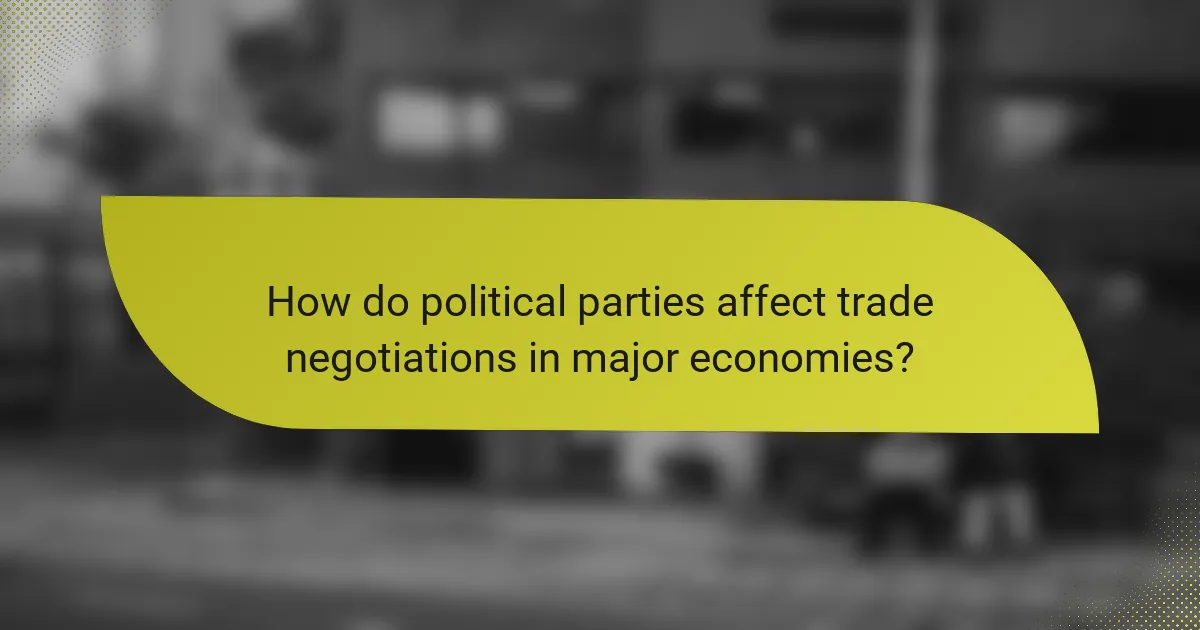
How do political parties affect trade negotiations in major economies?
Political parties play a crucial role in shaping trade negotiations in major economies by influencing policy priorities and negotiation strategies. Their ideologies and platforms can determine the extent of trade liberalization or protectionism, impacting international agreements and economic relationships.
Negotiation tactics used by political parties
Political parties employ various negotiation tactics that reflect their economic philosophies. For instance, parties favoring free trade may advocate for open markets and reduced tariffs, while protectionist parties might push for stricter import regulations and tariffs to safeguard domestic industries. These tactics can significantly alter the dynamics of trade talks, affecting outcomes like market access and regulatory standards.
Additionally, political parties often use coalition-building as a tactic to strengthen their negotiating position. By aligning with like-minded parties or interest groups, they can present a united front, increasing their leverage in negotiations. This can lead to more favorable terms in trade agreements, as the collective influence can sway negotiations in their favor.
Coalition politics and trade outcomes
Coalition politics can profoundly impact trade outcomes by shaping the priorities and strategies of negotiating parties. In multi-party systems, the need for alliances can lead to compromises that reflect a broader range of interests, which may either enhance or hinder trade liberalization. For example, a coalition government may include both pro-trade and protectionist parties, resulting in a trade agreement that balances liberalization with safeguards for sensitive industries.
Moreover, the stability of coalitions can affect the consistency of trade policies. A fragile coalition may lead to frequent shifts in trade strategy, creating uncertainty for international partners. Conversely, a stable coalition can provide a more predictable trade environment, encouraging foreign investment and long-term economic relationships. Understanding these dynamics is essential for businesses and stakeholders engaged in international trade.
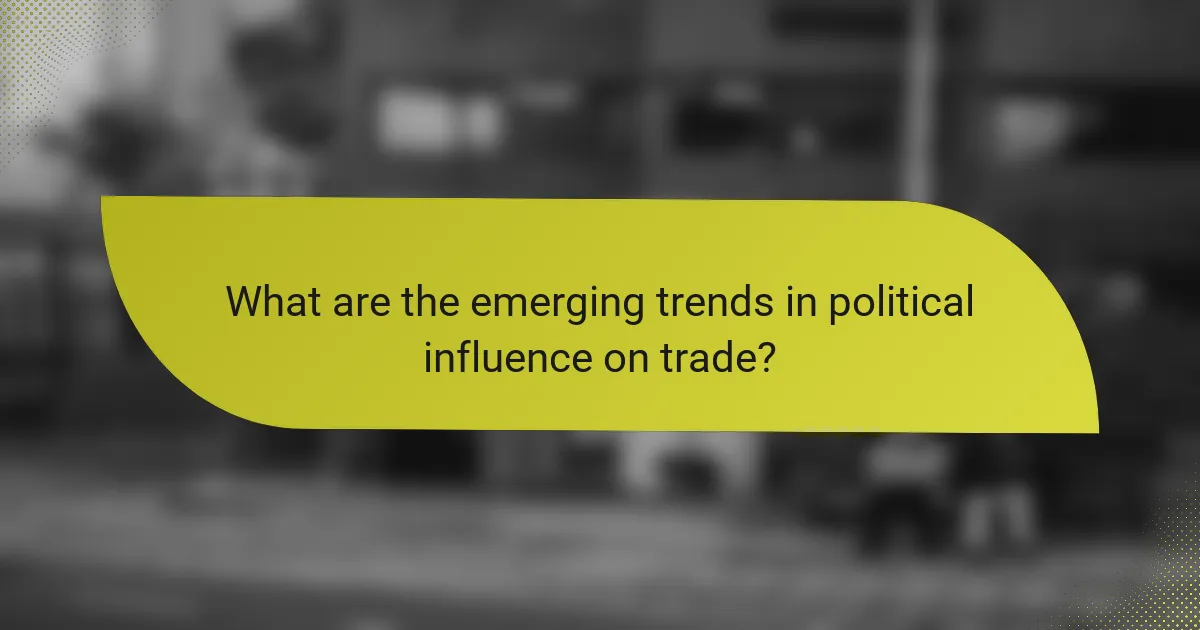
What are the emerging trends in political influence on trade?
Emerging trends in political influence on trade reveal a shift towards protectionism and a reevaluation of global trade agreements. Political parties increasingly shape trade policies based on domestic priorities, often prioritizing national interests over international cooperation.
Rise of populist parties and trade protectionism
The rise of populist parties has led to a significant increase in trade protectionism across various countries. These parties often advocate for policies that favor local industries, resulting in tariffs and trade barriers aimed at reducing imports and promoting domestic production.
For example, in the United States, recent populist movements have pushed for renegotiating trade agreements to better protect American jobs. Similar trends can be observed in Europe, where populist parties have gained traction by opposing free trade agreements that they argue undermine local economies.
Impact of global crises on party trade policies
Global crises, such as economic downturns or pandemics, have a profound impact on political parties’ trade policies. During such events, parties may adopt more protectionist stances to safeguard national interests, often citing the need for economic resilience.
For instance, the COVID-19 pandemic prompted many governments to reconsider their reliance on global supply chains, leading to calls for increased domestic production and reduced imports. This shift can result in significant changes to existing trade agreements and the introduction of new regulations aimed at bolstering local economies.
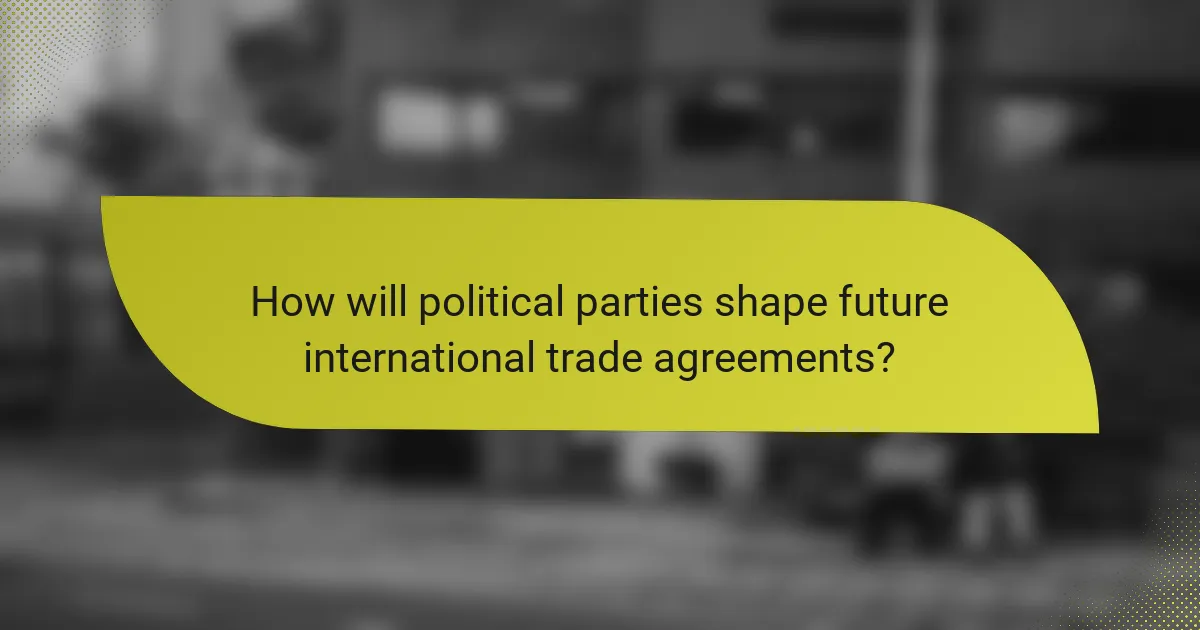
How will political parties shape future international trade agreements?
Political parties will significantly influence future international trade agreements through their platforms, priorities, and the ideologies they promote. The direction they take can affect tariffs, trade partnerships, and regulatory standards, ultimately impacting economic growth and consumer prices.
Predictions for upcoming elections
In upcoming elections, political parties are likely to focus on trade policies that resonate with their voter bases. For instance, left-leaning parties may advocate for fair trade practices and environmental regulations, while right-leaning parties might prioritize deregulation and free trade agreements.
Voter sentiment regarding globalization and domestic job protection will play a crucial role in shaping party platforms. Candidates who align their trade policies with public opinion on these issues may gain a competitive edge, influencing the overall direction of trade agreements.
As elections approach, monitoring party positions on trade can provide insights into potential shifts in international agreements. Engaging with local business communities and advocacy groups can also help gauge how these changes might impact specific sectors.
